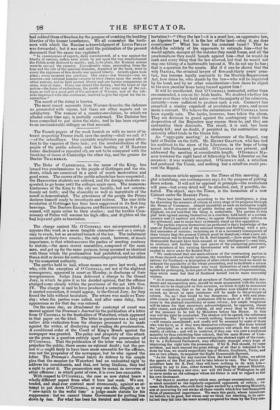The charge against Mr. O'CONNELL was misrepresented ; it appears
this week in a more tangible character—not as a conspi- racy to evade, but as an actual breach of the law. The indictment consists of thirty-two counts ; the only count, however, of much importance, is that which accuses the parties of meeting contrary to statute,—the more recent assemblies, composed of the same men, and got up for the same purpose, being assumed as identical with those which the proclamation had prohibited, and no other thana shift or device for continuingproceedings previously forbidden by the competent authority. The parties held to bail, whose names we gave last week, and who, with the exception of O'CONNELL, are not of the slightest consequence, appeared in court on Monday, in discharge of their recognizances. Judge JEBB delivered a charge to the Grand Jury, in which he gave it as his decided opinion, that the offence charged came clearly within the provisions of the act 10th Geo. IV. The charge is said to have produced a sensation in Dublin: it carried conviction, it would appear, to the Grand Jury, for they found the bills without hesitation. The return was made on Tues- day; when the parties were called, and after some delay, their appearance as for that day was entered. On the same day, an attachment for contempt of court was moved against the Reeman's Journal for the publication of a letter from 0' CONNELL to the freeholders of Waterford, which appeared in that paper on the 22nd. The letter in question was a long and rather able vindication from the charges presumed to be made against the writer, of disobeying and evading the proclamation. A .conditional order of the Court of King's Bench against the newspaper was granted. The policy and propriety of this attack on the press is a question entirely apart from the prosecution of O'CONNELL. That the publication of the letter was intended to prejudice the public, there seems no rational doubt; but the per- son w;i-o ought fairly to have been made amenable for the offence, was not the proprietor of the newspaper, but he who signed the letter. The Freeman's Journal limits its defence to the simple plea that the member for Waterford had an undoubted right to address his constituents, and that, not being libellous, they had a tight to print it. The prosecution may be meant in terrorem of other offences; in which point of view, it is even less excusable. With respect to O'CONNELL, the case as now stated bears a wholly different aspect from what it bore last week. We con tended, and shall ever contend most strenuously, against an at- tempt to put down O'CONNELL, or any one else, illegally, or to " new-hatch to the woful time" a judge-made statute for his suppression : but we cannot blame Government for putting him down by law. For what has been his iterated and reiterated ex- hortation?—" Obey the law !—it is a cruel law, an oppressive law, an Algerine la.va ; but it is the law of the land—obey it, my dear countrymen !" What has been his constant boast ? That he defied.the subtlety of his opponents to entangle him—that he would agitate, maugre all the statutes they could frame, and all the proclamations they could launch against him—that he would do each -and every thing that the law allowed, but that he would not step one tithing of a hairbreadth beyond it. We do not say he has ; that is a question for the courts. But if it can be shown that the wily DANIEL, the criminal lawyer of five-and-thirty years' prac- tice, has become legally amenable to the Meeting-Suppression Act, how dares he, who stands by the law—who will be regulated. by his bond, and by no other consideration—how dares he object to his own peculiar fence being turned against him ? It will be recollected, that O'CONNELL insinuated, rather than recommended, a run on the Irish banks. We doubted whether his power over those who hold notes—not thernajority of his admirers, certainly—were sufficient to produce such a run. COBBETT has preached a similar expedient of revolution for years, and never made a convert. We believe the exhortations of O'CONNELL have been equally vain. The banks, however, have taken the alarm. They are desirous to guard against the -contingency which the desperation of the Repealers may expose them to, and they are contracting their discounts. The result, it is said, has been already felt ; and no doubt, if persisted in, the contraction may seriously affect trade in the Green Isle.
An "aggregate meeting," in furtherance of the Repeal, was held at Dublin on the 25th. Mr. HENRY GRATTAN, who has tied his cockhoat to the stern of the Liberator, in the hope of being towed into Parliament, presided. O'CONNELL was present, and addressed the meeting at considerable length. O'GoamAN MA- HON tendered the right hand of fellowship to the Liberator on the occasion : it was warmly accepted. O'GORMAN said, a rebellion had produced the Union, and nothing but a rebellion could Pre- vent the Repeal.


























 Previous page
Previous page